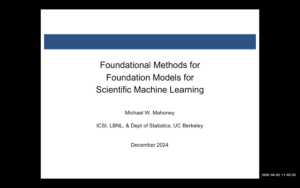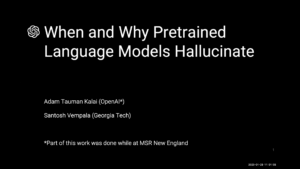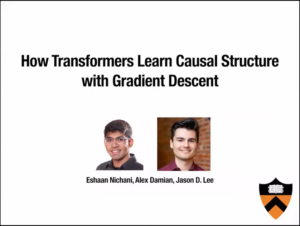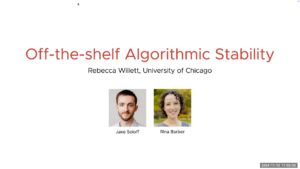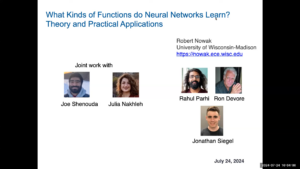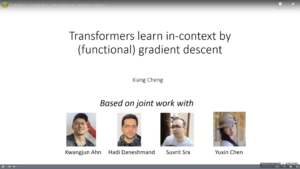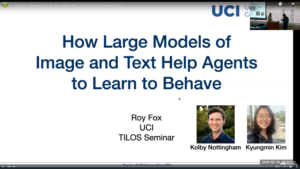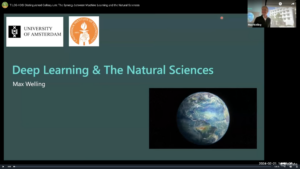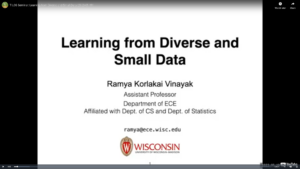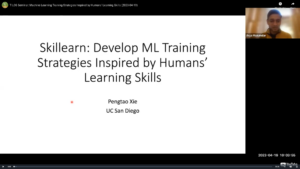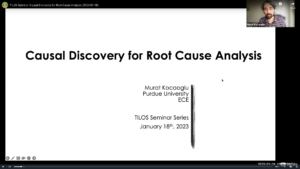Recorded Talks: Machine Learning
Flat Minima and Generalization: from Matrix Sensing to Neural Networks
Maryam Fazel, University of Washington
When do overparameterized neural networks avoid overfitting and generalize to unseen data? Empirical evidence suggests that the shape of the training loss function near the solution matters—the minima where the loss is “flatter” tend to lead to better generalization. Yet quantifying flatness and its rigorous analysis, even in simple models, has been limited. In this talk, we examine overparameterized nonconvex models such as low-rank matrix sensing, matrix completion, robust PCA, as well as a 2-layer neural network as test cases. We show that under standard statistical assumptions, "flat" minima (minima with the smallest local average curvature, measured by the trace of the Hessian matrix) provably generalize in all these cases. These algorithm-agnostic results suggest a theoretical basis for favoring methods that bias iterates towards flat solutions, and help inform the design of better training algorithms.
Hunting the Hessian
Madeleine Udell, Stanford University
Ill conditioned loss landscapes are ubiquitous in machine learning, and they slow down optimization. Preconditioning the gradient to make the loss more isotropic is a natural solution, but is challenging for extremely large problems, as direct access to the problem Hessian is prohibitively expensive. We present two fresh approaches to preconditioning using tools from randomized numerical linear algebra and online convex optimization for efficient access to Hessian information, motivated by the question: what is the most useful information we can query from the problem Hessian using linear memory and compute?
One Small Step, One Giant Leap: From Test-Time Tweaks to Global Guarantees
Mahdi Soltanolkotabi, USC
Simple first-order methods like Gradient Descent (GD) remain foundational to modern machine learning. Yet, despite their widespread use, our theoretical understanding of the GD trajectory—how and why it works—remains incomplete in both classical and contemporary settings. This talk explores new horizons in understanding the behavior and power of GD across two distinct but connected fronts.
In the first part, we examine the surprising power of a single gradient step in enhancing model reasoning. We focus on test-time training (TTT)—a gradient-based approach that adapts model parameters using individual test instances. We introduce a theoretical framework that reveals how TTT can effectively handle distribution shifts and significantly reduce the data required for in-context learning, shedding light on why such simple methods often outperform expectations.
The second part turns to a more classical optimization setting: learning shallow neural networks with GD. Despite extensive study, even fitting a one-hidden-layer model to basic target functions lacks rigorous performance guarantees. We present a comprehensive analysis of the GD trajectory in this regime, showing how it avoids suboptimal stationary points and converges efficiently to global optima. Our results offer new theoretical foundations for understanding how GD succeeds in the presence of sub-optimal stationary points.
Unleashing the Power of Variance Reduction for Training Large Models
Quanquan Gu, Caltech
Training deep neural networks—and more recently, large language models demands efficient and scalable optimizers. Adaptive gradient algorithms like Adam, AdamW, and their variants have been central to this task. Despite the development of numerous variance reduction algorithms in the past decade aimed at accelerating stochastic optimization in both convex and nonconvex settings, variance reduction has not found widespread success in training deep neural networks or large language models. Consequently, it has remained a less favored approach in modern AI. In this talk, I will introduce a unified optimization framework, MARS (Make vAriance Reduction Shine), which reconciles preconditioned gradient methods with variance reduction via a scaled stochastic recursive momentum technique. Within this framework, I will introduce three instances of MARS that leverage preconditioned gradient updates based on AdamW, Lion, and Shampoo, respectively. In addition, I will draw a connection between our algorithms and existing optimizers. Experimental results on training GPT-2 models indicate that MARS consistently outperforms AdamW by a large margin.
Foundational Methods for Foundation Models for Scientific Machine Learning
Michael W. Mahoney, LBNL and UC Berkeley
The remarkable successes of ChatGPT in natural language processing (NLP) and related developments in computer vision (CV) motivate the question of what foundation models would look like and what new advances they would enable, when built on the rich, diverse, multimodal data that are available from large-scale experimental and simulational data in scientific computing (SC), broadly defined. Such models could provide a robust and principled foundation for scientific machine learning (SciML), going well beyond simply using ML tools developed for internet and social media applications to help solve future scientific problems. I will describe recent work demonstrating the potential of the “pre-train and fine-tune” paradigm, widely-used in CV and NLP, for SciML problems, demonstrating a clear path towards building SciML foundation models; as well as recent work highlighting multiple “failure modes” that arise when trying to interface data-driven ML methodologies with domain-driven SC methodologies, demonstrating clear obstacles to traversing that path successfully. I will also describe initial work on developing novel methods to address several of these challenges, as well as their implementations at scale, a general solution to which will be needed to build robust and reliable SciML models consisting of millions or billions or trillions of parameters.
Michael W. Mahoney is at the University of California at Berkeley in the Department of Statistics and at the International Computer Science Institute (ICSI). He is also an Amazon Scholar as well as head of the Machine Learning and Analytics Group at the Lawrence Berkeley National Laboratory. He works on algorithmic and statistical aspects of modern large-scale data analysis. Much of his recent research has focused on large-scale machine learning, including randomized matrix algorithms and randomized numerical linear algebra, scientific machine learning, scalable stochastic optimization, geometric network analysis tools for structure extraction in large informatics graphs, scalable implicit regularization methods, computational methods for neural network analysis, physics informed machine learning, and applications in genetics, astronomy, medical imaging, social network analysis, and internet data analysis. He received his PhD from Yale University with a dissertation in computational statistical mechanics, and he has worked and taught at Yale University in the mathematics department, at Yahoo Research, and at Stanford University in the mathematics department. Among other things, he was on the national advisory committee of the Statistical and Applied Mathematical Sciences Institute (SAMSI), he was on the National Research Council’s Committee on the Analysis of Massive Data, he co-organized the Simons Institute’s fall 2013 and 2018 programs on the foundations of data science, he ran the Park City Mathematics Institute’s 2016 PCMI Summer Session on The Mathematics of Data, he ran the biennial MMDS Workshops on Algorithms for Modern Massive Data Sets, and he was the Director of the NSF/TRIPODS-funded FODA (Foundations of Data Analysis) Institute at UC Berkeley. More information is available at https://www.stat.berkeley.edu/~mmahoney/.
Unlearnable Facts Cause Hallucinations in Pretrained Language Models
Adam Tauman Kalai, OpenAI
Pretrained language models (LMs) tend to preserve many qualities present in their training data, such as grammaticality, formatting, and politeness. However, for specific types of factuality, even LMs pretrained on factually correct statements tend to produce falsehoods at high rates. We explain these “hallucinations” by drawing a connection to binary classification, enabling us to leverage insights from supervised learning. We prove that pretrained LMs (which are “calibrated”) fail to mimic criteria that cannot be learned. Our analysis explains why pretrained LMs hallucinate on facts such as people’s birthdays but not on systematic facts such as even vs. odd numbers.
Of course, LM pretraining is only one stage in the development of a chatbot, and thus hallucinations are *not* inevitable in chatbots.
This is joint work with Santosh Vempala.
Adam Tauman Kalai is a Research Scientist at OpenAI working on AI Safety and Ethics. He has worked in Algorithms, Fairness, Machine Learning Theory, Game Theory, and Crowdsourcing. He received his PhD from Carnegie Mellon University. He has served as an Assistant Professor at Georgia Tech and TTIC, and is on the science team of the whale-translation Project CETI. He has co-chaired AI and crowdsourcing conferences and has numerous honors, most notably the Majulook prize.
How Transformers Learn Causal Structure with Gradient Descent
Jason Lee, Princeton University
The incredible success of transformers on sequence modeling tasks can be largely attributed to the self-attention mechanism, which allows information to be transferred between different parts of a sequence. Self-attention allows transformers to encode causal structure which makes them particularly suitable for sequence modeling. However, the process by which transformers learn such causal structure via gradient-based training algorithms remains poorly understood. To better understand this process, we introduce an in-context learning task that requires learning latent causal structure. We prove that gradient descent on a simplified two-layer transformer learns to solve this task by encoding the latent causal graph in the first attention layer. The key insight of our proof is that the gradient of the attention matrix encodes the mutual information between tokens. As a consequence of the data processing inequality, the largest entries of this gradient correspond to edges in the latent causal graph. As a special case, when the sequences are generated from in-context Markov chains, we prove that transformers learn an induction head (Olsson et al., 2022). We confirm our theoretical findings by showing that transformers trained on our in-context learning task are able to recover a wide variety of causal structures.
Jason Lee is an associate professor in Electrical Engineering and Computer Science (secondary) at Princeton University. Prior to that, he was in the Data Science and Operations department at the University of Southern California and a postdoctoral researcher at UC Berkeley working with Michael I. Jordan. Jason received his PhD at Stanford University advised by Trevor Hastie and Jonathan Taylor. His research interests are in the theory of machine learning, optimization, and statistics. Lately, he has worked on the foundations of deep learning, representation learning, and reinforcement learning. He has received the Samsung AI Researcher of the Year Award, NSF Career Award, ONR Young Investigator Award in Mathematical Data Science, Sloan Research Fellowship, NeurIPS Best Student Paper Award and Finalist for the Best Paper Prize for Young Researchers in Continuous Optimization, and Princeton Commendation for Outstanding Teaching.
Off-the-shelf Algorithmic Stability
Rebecca Willett, University of Chicago
Algorithmic stability holds when our conclusions, estimates, fitted models, predictions, or decisions are insensitive to small changes to the training data. Stability has emerged as a core principle for reliable data science, providing insights into generalization, cross-validation, uncertainty quantification, and more. Whereas prior literature has developed mathematical tools for analyzing the stability of specific machine learning (ML) algorithms, we study methods that can be applied to arbitrary learning algorithms to satisfy a desired level of stability. First, I will discuss how bagging is guaranteed to stabilize any prediction model, regardless of the input data. Thus, if we remove or replace a small fraction of the training data at random, the resulting prediction will typically change very little. Our analysis provides insight into how the size of the bags (bootstrap datasets) influences stability, giving practitioners a new tool for guaranteeing a desired level of stability. Second, I will describe how to extend these stability guarantees beyond prediction modeling to more general statistical estimation problems where bagging is not as well known but equally useful for stability. Specifically, I will describe a new framework for stable classification and model selection by combining bagging on class or model weights with a stable, “soft” version of the argmax operator.
Rebecca Willett is a Professor of Statistics and Computer Science and the Director of AI in the Data Science Institute at the University of Chicago, and she holds a courtesy appointment at the Toyota Technological Institute at Chicago. Her research is focused on machine learning foundations, scientific machine learning, and signal processing. Willett received the inaugural Data Science Career Prize from the Society of Industrial and Applied Mathematics in 2024, was named a Fellow of the Society of Industrial and Applied Mathematics in 2021, and was named a Fellow of the IEEE in 2022. She is the Deputy Director for Research at the NSF-Simons Foundation National Institute for Theory and Mathematics in Biology, Deputy Director for Research at the NSF-Simons Institute for AI in the Sky (SkAI), and a member of the NSF Institute for the Foundations of Data Science Executive Committee. She is the Faculty Director of the Eric and Wendy Schmidt AI in Science Postdoctoral Fellowship. She helps direct the Air Force Research Lab University Center of Excellence on Machine Learning. She received the National Science Foundation CAREER Award in 2007, was a DARPA Computer Science Study Group member, and received an Air Force Office of Scientific Research Young Investigator Program award in 2010. She completed her PhD in Electrical and Computer Engineering at Rice University in 2005. She was an Assistant and then tenured Associate Professor of Electrical and Computer Engineering at Duke University from 2005 to 2013. She was an Associate Professor of Electrical and Computer Engineering, Harvey D. Spangler Faculty Scholar, and Fellow of the Wisconsin Institutes for Discovery at the University of Wisconsin-Madison from 2013 to 2018.
What Kinds of Functions do Neural Networks Learn? Theory and Practical Applications
Robert Nowak, University of Wisconsin
This talk presents a theory characterizing the types of functions neural networks learn from data. Specifically, the function space generated by deep ReLU networks consists of compositions of functions from the Banach space of second-order bounded variation in the Radon transform domain. This Banach space includes functions with smooth projections in most directions. A representer theorem associated with this space demonstrates that finite-width neural networks suffice for fitting finite datasets. The theory has several practical applications. First, it provides a simple and theoretically grounded method for network compression. Second, it shows that multi-task training can yield significantly different solutions compared to single-task training, and that multi-task solutions can be related to kernel ridge regressions. Third, the theory has implications for improving implicit neural representations, where multi-layer neural networks are used to represent continuous signals, images, or 3D scenes. This exploration bridges theoretical insights with practical advancements, offering a new perspective on neural network capabilities and future research directions.
Robert Nowak is the Grace Wahba Professor of Data Science and Keith and Jane Nosbusch Professor in Electrical and Computer Engineering at the University of Wisconsin-Madison. His research focuses on machine learning, optimization, and signal processing. He serves on the editorial boards of the SIAM Journal on the Mathematics of Data Science and the IEEE Journal on Selected Areas in Information Theory.
Transformers Learn In-context by (Functional) Gradient Descent
Xiang Cheng, TILOS Postdoctoral Scholar at MIT
Motivated by the in-context learning phenomenon, we investigate how the Transformer neural network can implement learning algorithms in its forward pass. We show that a linear Transformer naturally learns to implement gradient descent, which enables it to learn linear functions in-context. More generally, we show that a non-linear Transformer can implement functional gradient descent with respect to some RKHS metric, which allows it to learn a broad class of functions in-context. Additionally, we show that the RKHS metric is determined by the choice of attention activation, and that the optimal choice of attention activation depends in a natural way on the class of functions that need to be learned. I will end by discussing some implications of our results for the choice and design of Transformer architectures.
How Large Models of Language and Vision Help Agents to Learn to Behave
Roy Fox, Assistant Professor and Director of the Intelligent Dynamics Lab, UC Irvine
If learning from data is valuable, can learning from big data be very valuable? So far, it has been so in vision and language, for which foundation models can be trained on web-scale data to support a plethora of downstream tasks; not so much in control, for which scalable learning remains elusive. Can information encoded in vision and language models guide reinforcement learning of control policies? In this talk, I will discuss several ways for foundation models to help agents to learn to behave. Language models can provide better context for decision-making: we will see how they can succinctly describe the world state to focus the agent on relevant features; and how they can form generalizable skills that identify key subgoals. Vision and vision–language models can help the agent to model the world: we will see how they can block visual distractions to keep state representations task-relevant; and how they can hypothesize about abstract world models that guide exploration and planning.
Roy Fox is an Assistant Professor of Computer Science at the University of California, Irvine. His research interests include theory and applications of control learning: reinforcement learning (RL), control theory, information theory, and robotics. His current research focuses on structured and model-based RL, language for RL and RL for language, and optimization in deep control learning of virtual and physical agents.
The Synergy between Machine Learning and the Natural Sciences
Max Welling, Research Chair in Machine Learning, University of Amsterdam
Traditionally machine learning has been heavily influenced by neuroscience (hence the name artificial neural networks) and physics (e.g. MCMC, Belief Propagation, and Diffusion based Generative AI). We have recently witnessed that the flow of information has also reversed, with new tools developed in the ML community impacting physics, chemistry and biology. Examples include faster DFT, Force-Field accelerated MD simulations, PDE Neural Surrogate models, generating druglike molecules, and many more. In this talk I will review the exciting opportunities for further cross fertilization between these fields, ranging from faster (classical) DFT calculations and enhanced transition path sampling to traveling waves in artificial neural networks.
Prof. Max Welling is a research chair in Machine Learning at the University of Amsterdam and a Distinguished Scientist at MSR. He is a fellow at the Canadian Institute for Advanced Research (CIFAR) and the European Lab for Learning and Intelligent Systems (ELLIS) where he also serves on the founding board. His previous appointments include VP at Qualcomm Technologies, professor at UC Irvine, postdoc at U. Toronto and UCL under supervision of prof. Geoffrey Hinton, and postdoc at Caltech under supervision of prof. Pietro Perona. He finished his PhD in theoretical high energy physics under supervision of Nobel laureate Prof. Gerard ‘t Hooft.
TILOS Seminar: Learning from Diverse and Small Data
Ramya Korlakai Vinayak, Assistant Professor, University of Wisconsin at Madison
In this talk, we will address this question in the following settings:
(i) In many applications, we observe count data which can be modeled as Binomial (e.g., polling, surveys, epidemiology) or Poisson (e.g., single cell RNA data) data. As a single or finite parameters do not capture the diversity of the population in such datasets, they are often modeled as nonparametric mixtures. In this setting, we will address the following question, “how well can we learn the distribution of parameters over the population without learning the individual parameters?” and show that nonparametric maximum likelihood estimators are in fact minimax optimal.
(ii) Learning preferences from human judgements using comparison queries plays a crucial role in cognitive and behavioral psychology, crowdsourcing democracy, surveys in social science applications, and recommendation systems. Models in the literature often focus on learning average preference over the population due to the limitations on the amount of data available per individual. We will discuss some recent results on how we can reliably capture diversity in preferences while pooling together data from individuals.
Ramya Korlakai Vinayak is an assistant professor in the Dept. of ECE and affiliated faculty in the Dept. of Computer Science and the Dept. of Statistics at the UW-Madison. Her research interests span the areas of machine learning, statistical inference, and crowdsourcing. Her work focuses on addressing theoretical and practical challenges that arise when learning from societal data. Prior to joining UW-Madison, Ramya was a postdoctoral researcher in the Paul G. Allen School of Computer Science and Engineering at the University of Washington. She received her Ph.D. in Electrical Engineering from Caltech. She obtained her Masters from Caltech and Bachelors from IIT Madras. She is a recipient of the Schlumberger Foundation Faculty of the Future fellowship from 2013-15, and an invited participant at the Rising Stars in EECS workshop in 2019. She is the recipient of NSF CAREER Award 2023-2028.
TILOS Seminar: Machine Learning Training Strategies Inspired by Humans' Learning Skills
Pengtao Xie, Assistant Professor, UC San Diego
Humans, as the most powerful learners on the planet, have accumulated a lot of learning skills, such as learning through tests, interleaving learning, self-explanation, active recalling, to name a few. These learning skills and methodologies enable humans to learn new topics more effectively and efficiently. We are interested in investigating whether humans' learning skills can be borrowed to help machines to learn better. Specifically, we aim to formalize these skills and leverage them to train better machine learning (ML) models. To achieve this goal, we develop a general framework--Skillearn, which provides a principled way to represent humans' learning skills mathematically and use the formally-represented skills to improve the training of ML models. In two case studies, we apply Skillearn to formalize two learning skills of humans: learning by passing tests and interleaving learning, and use the formalized skills to improve neural architecture search.
Pengtao Xie is an assistant professor at UC San Diego. He received his PhD from the Machine Learning Department at Carnegie Mellon University in 2018. His research interests lie in machine learning inspired by human learning and its applications in healthcare. His research outcomes have been adopted by medical device companies, medical imaging centers, hospitals, etc. and have been published at top-tier artificial intelligence conferences and journals including ICML, NeurIPS, ACL, ICCV, TACL, etc. He is the recipient of the Tencent AI-Lab Faculty Award, Tencent WeChat Faculty Award, the Innovator Award presented by the Pittsburgh Business Times, the Siebel Scholars award, and the Goldman Sachs Global Leader Scholarship.
TILOS Seminar: Causal Discovery for Root Cause Analysis
Professor Murat Kocaoglu, Assistant Professor, Purdue University
Cause-effect relations are crucial for several fields, from medicine to policy design as they inform us of the outcomes of our actions a priori. However, causal knowledge is hard to curate for complex systems that might be changing frequently. Causal discovery algorithms allow us to extract causal knowledge from the available data. In this talk, first, we provide a short introduction to algorithmic causal discovery. Next, we propose a novel causal discovery algorithm from a collection of observational and interventional datasets in the presence of unobserved confounders, with unknown intervention targets. Finally, we demonstrate the effectiveness of our algorithm for root-cause analysis in microservice architectures.
Dr. Kocaoglu received his B.S. degree in Electrical-Electronics Engineering with a minor in Physics from the Middle East Technical University in 2010, his M.S. degree from the Koc University, Turkey in 2012, and his Ph.D. degree from The University of Texas at Austin in 2018 under the supervision of Prof. Alex Dimakis and Prof. Sriram Vishwanath. He was a Research Staff Member in the MIT-IBM Watson AI Lab in IBM Research, Cambridge, Massachusetts from 2018 to 2020. Since 2021, he is an assistant professor in the School of ECE at Purdue University. His current research interests include causal inference and discovery, causal machine learning, deep generative models, and information theory.
IEEE Seasonal School: Manufacturability, Testing, Reliability, and Security
00:00:00 - Introduction
01:51:00 - "Machine Learning for DFM", Bei Yu, Associate Professor, Chinese University of Hong Kong
59:54:00 - "ML for Testing and Yield", Li-C. Wang, Professor, UC Santa Barbara
01:59:00 - "ML for Cross-Layer Reliability and Security", Muhammad Shafique, Professor of Computer Engineering, NYU Abu Dhabi





